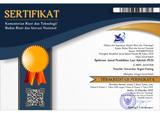Relationship between the Drill Method and the Speed of Residents Learning to Sew Bed Covers at PKBM Tenggang Raso, Padang City
 ), Jamaris Jamna(2),
), Jamaris Jamna(2), (1) Universitas Negeri Padang
(2) Universitas Negeri Padang
 Corresponding Author
Corresponding Author
DOI : https://doi.org/10.24036/spektrumpls.v9i1.111248
Full Text:
 Language : en
Language : en
Abstract
This research is motivated by the speed with which residents learn in sewing bed cover skills at PKBM Tenggang Raso Padang City, this is presumably due to the use of appropriate methods by tutors. This study aims to: determine the use of the drill method in the process of sewing bed cover skills, knowing the speed of learning citizens in the sewing skills process of bed cover, knowing the relationship between the drill method and the speed at which residents learn in sewing bed cover skills. The population in this study were residents learning the skills to sew bed covers at PKBM Tenggang Raso. The sampling technique used cluster random sampling which was taken half of the population. The data collection technique used was a questionnaire, while the data collection tool used a questionnaire sheet in the form of a list of statements. The data analysis technique uses the Percentage formula and the Spearman Rho formula. The results of this study indicate that: the use of the drill method in PKBM Tenggang Raso Padang City is able to accelerate the speed of learning residents in sewing bed covers, the speed of learning residents in sewing bed cover sewing skills is categorized as fast, and there is a significant relationship between the drill method and the speed at which residents learn to sew. bed cover at PKBM Tenggang Raso Padang City.
Keywords: The Drill Method, The Speed of the Learning Community, Sewing the Bed Cover
References
Arikunto, S. (2006). Prosedur Penelitian Suatu Pendekatan Praktik (VI). Jakarta: Rineka Cipta.
Hamiyah, N. (2014). Strategi Belajar Mengajar di Kelas. Jakarta: Prestasi Pustaka.
Harsono. (1988). Coaching dan Aspek-aspek Psikologis dalam Coaching. Bandung: CV Tambak Kusuma.
Hasibuan, J., & Moedjiono. (2000). Proses Belajar Mengajar. Bandung: PT Remaja Rosdakarya.
Raharjo, T. J., Suminar, T., & Mu’arifuddin. (2016). Peran Pusat Kegiatan Belajar Masyarakat dalam Menanggulangi Kemiskinan Melalui Pendidikan Nonformal di Jawa Tengah. Journal of Nonformal Education, 2(1), 21–38. https://doi.org/10.15294/jne.v2i1.5310
Sagala, S. (2010). Konsep dan Makna Pembelajaran. Bandung: Alfabeta.
Satori, D. (2002). Implementasi Life Skill dalam Konteks Pendidikan di Sekolah. Jurnal Pendidikan Dan Kebudayaan, 8(34).
Sudjana, D. (2004). Pendidikan Nonformal. Bandung: Falah Production.
Sudjana, N. (2013). Dasar-Dasar Proses Belajar Mengajar. Bandung: Sinar Baru Algesindo.
Sugiyono. (2014). Metode Penelitian Pendidikan: Pendekatan Kuantitatif, Kualitatif dan R&D. Bandung: Alfabeta.
Supriyanto, H. (2007). Pendidikan Orang Dewasa: Dari Teori hingga Aplikasi. Jakarta: PT Bumi Aksara.
Wibowo, P. (2013). Keberlanjutan Kemitraan Pusat Kegiatan Belajar Masyarakat. Jurnal Pendidikan Humaniora, 49(1), 44–49. Retrieved from http://journal.um.ac.id/index.php/jph/article/view/3960
Widiastuti. (2011). Tes dan Pengukuran Olahraga. Jakarta: PT Bumi Timur Jaya.
Winkel, W. (1996). Psikologi Pengajaran. Jakarta: PT Grasindo.
 Article Metrics
Article Metrics
 Abstract Views : 122 times
Abstract Views : 122 times
 PDF Downloaded : 43 times
PDF Downloaded : 43 times
Refbacks
- There are currently no refbacks.

This work is licensed under a Creative Commons Attribution-NonCommercial 4.0 International License.



